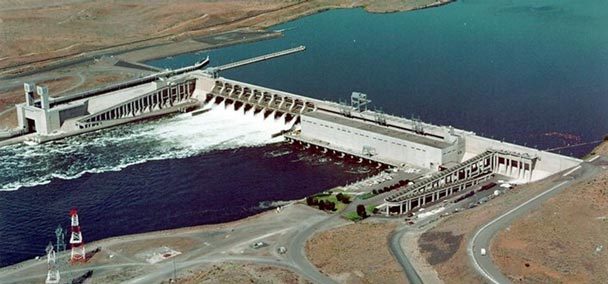forum
library
tutorial
contact

Feds Can't Avoid Helping
Salmon Survive Dams, Judges Rule
by Karina Brown
Courthouse News, April 2, 2018
|
the film forum library tutorial contact |

|
Feds Can't Avoid Helping
by Karina Brown
|
 (CN) - The federal government must heed a federal court ruling that found it was not doing enough to protect endangered salmon and steelhead, and directing it to change dam operations along the Columbia River accordingly, the Ninth Circuit ruled Monday.
(CN) - The federal government must heed a federal court ruling that found it was not doing enough to protect endangered salmon and steelhead, and directing it to change dam operations along the Columbia River accordingly, the Ninth Circuit ruled Monday.
The ruling is the latest development in a 17-year legal battle where U.S. District Judge Michael Simon has repeatedly found that the government produced faulty biological opinions claiming that continued operation of the eight dams in the in the Federal Columbia River Power System would not jeopardize endangered salmon and steelhead.
In a May 2016 ruling, Simon sent the government back to the drawing board for the fourth time in 15 years, telling it to develop an effective plan to help fish survive the gauntlet of dams between the rivers where they hatch and return to spawn and the ocean where they live most of their lives. This time, Simon said, the government had to consider every reasonable method to protect fish, including the removal of dams that provide cheap, clean electricity to hundreds of thousands of homes.
In the meantime, Simon ordered the federal government to spill more water over the dams so that young fish would have an easier time swimming past. Simon also ordered the government to disclose any substantial investments in the dam system, finding that such investments could bias the government against making changes in dam operations.
The government appealed, as did Northwest RiverPartners, a coalition of farmers and industrial interests that depend on irrigation water from the dams' reservoirs.
A three-judge panel for the Ninth Circuit Court of Appeals refused to toss the order to disclose investments, finding that that decision was not properly before the appeals court because it did not represent a modification of the injunction currently in place under the National Environmental Policy Act.
The government wanted the court to trim its opinion to address only the increased spill, and not the operation of the dams as a whole. But the panel found that such a narrow order was not required by law, and that it was impractical to separate harm caused by increased spill from that caused by dam operations in general.
"The effects on listed species of the current spill regime on listed species cannot be cleanly divorced from the effects of FCRPS dam operations taken as a whole," Chief Judge Sidney Thomas wrote for the panel. "Listed species are exposed to the combined operations of the entire system."
Despite decades of work to revive the fish, the government's most recent data shows that the 13 listed species of salmon and steelhead in the Columbia River are in a "precarious," "imperiled" and "perilous" state. Only five of the 77 evolutionarily important populations of endangered fish in the basin are listed by the government as "viable" or "highly viable." The majority are at "high risk" of extinction.
Furthermore, the existence and operation of the dams is the major cause of death among juvenile salmon migrating through the Columbia River Basin, the panel wrote.
"Thus, there is a likelihood of irreparable harm to listed salmonids from the operation of the Federal Columbia River Power System dams as a whole," according to the ruling.
Northwest RiverPartners claimed that the even if the government's management plan did cause irreparable harm to endangered fish, it did not necessarily threaten them with total extinction within its ten-year time frame.
But such a finding is not required by the Endangered Species Act, the panel found.
"The district court was not required to find a short-term extinction-level threat to listed species in order to find likely irreparable harm for purposes of an ESA injunction," Thomas wrote. "It was not legal error or an abuse of discretion to base the injunction on a finding of a lesser magnitude of harm."
The irrigators also claimed that while the environmental groups that sued may have shown that dams harm fish, they did not show that the damage would affect them personally. That claim dovetails with calls from another irrigation group for the government to convene a Cabinet-level committee capable of waiving protections under the Endangered Species Act in favor of human activity. The so-called "God Squad," has only gathered three times, last being 25 years ago to sidestep some restrictions on logging intended to protect endangered spotted owls.
But the panel found that the environmentalists' self-described recreational and aesthetic enjoyment of the Snake and Columbia Rivers - and the harm caused to that enjoyment by drastically reduced fish populations - was enough to establish personal harm.
"Plaintiffs have shown irreparable harm to their own interests stemming from the irreparable harm to the listed species," Thomas wrote.
Related Pages:
Briefs Filed in Appeal of Spill Order in BiOp Case by Laura Berg, NW Fishletter, 12/4/17
learn more on topics covered in the film
see the video
read the script
learn the songs
discussion forum
